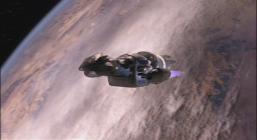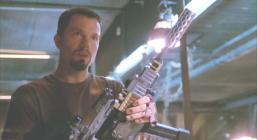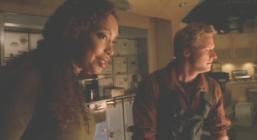IMDB: http://www.imdb.com/title/tt0303461/

|

|

|
| The ship | Jayne and Vera | More of the crew |
Well, yeah. Not bad at all. Characterisation is in broad strokes but at least there's more than one colour used per character; the technological background is clearly there for convenience rather than plausibility, but at least it is mostly applied consistently; and some of the stories that emerge in the fourteen extant episodes are quite interesting.
The problem with Firefly, though, as far as I'm concerned, is that it's still sci-fi rather than science fiction. As is usual with televised SF, with very few exceptions there's no story told here that couldn't be done as well in a traditional western, or a modern setting, or... Now, by television sci-fi standards it's good stuff; you're mostly comparing it with the interminable Star Trek series, Andromeda, SeaQuest DSV and the like, and only the occasional Babylon 5 or Stargate SG-1 or, yes, Firefly rises above the tide of claptrap. But for those of us who still remember how to read, even these are only a pale shadow of the real thing.
So, we have a society just after the not-Civil War, where the not-Union is lording it over the scattered settlements of the not-Confederacy. It is rather laid on with a trowel. Of course, this world's not-Confederacy doesn't seem to have had any not-slavery to provide an excuse, so the not-Union just comes over as an unambiguously Evil bunch of bullies. Helps to make it clear that the captain's a Good Guy even if he takes on some morally dubious missions from time to time.
Apparently the not-Confederacy only settled planets that look like the California desert. How convenient! Y'know, folks, generally if there's breathable air there's quite a bit of plant life, and if a planet has more than one sort of terrain I'm probably not going to plop my settlements down in a desert unless I've got a damn good reason...
What do these people do, anyway? The West survived because it had a market back East. These people spend their time being Poor; cargo ships are evidently pretty rare events, so that several worlds we see don't even have a spaceport. But the people have to be there for the plot to happen. It's the same with the technology: the force-field window makes for a good sight gag when someone gets thrown through it during a bar-fight, but that force-field technology is never mentioned again... even though you'd think that if it were cheap and reliable enough that a bar in an out-of-the-way pesthole is using it instead of glass, a bunch of other people would be using it too.
I think we can be glad the series was cancelled when it was. If Whedon had had another Buffy-style runaway success, he'd probably have given in more to his ego-massaging tendencies (very obvious in the extra material on the DVD release) and started to mess about with the characters just to generate "tension"; as it is there are some warning signs of that in the later episodes. Much like Bill Hanna and Joseph Barbera, Whedon seems to produce better material when he's being ridden by a non-artistic type who doesn't understand the Creative Vision but just wants to get the product out on time.
So, it's not bad. As television sci-fi goes it's pretty good. But it's still television sci-fi, and never comes close to rising above that.